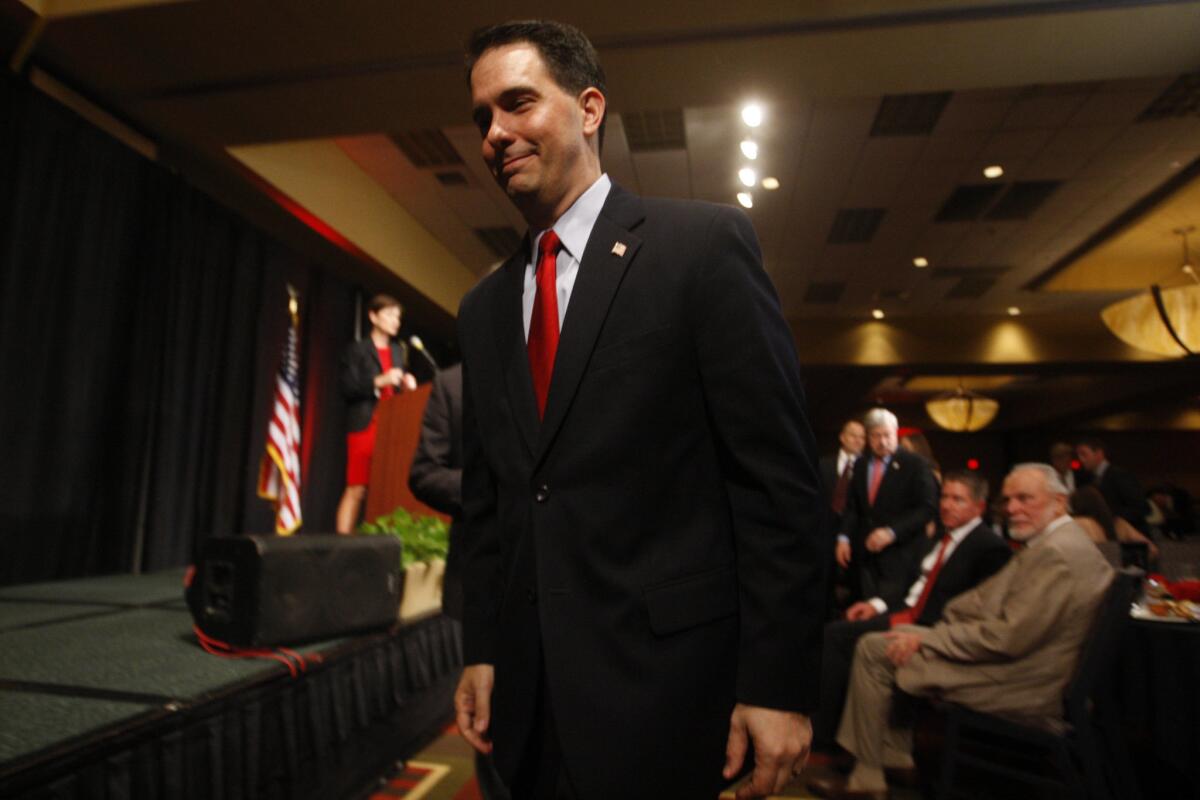Abortion, a losing issue for Wisconsin Gov. Scott Walker

- Share via
Wisconsin’s governor, Scott Walker, has rarely shied away from controversy. But on Friday, Walker seemed wary to draw much attention to a contentious abortion law he signed. The bill requires ultrasounds as a pre-condition for an abortion and bars procedures from doctors without admitting privileges to local hospitals.
Walker did not sign the law in public. There were no announcements or celebrations. Instead, his office issued a generically-titled news release: “Governor Scott Walker Signs Several Bills Into Law.” The statement goes through each of the 18 bills signed that day, assigning no greater or lesser importance to each one.
Politically, Walker is in a difficult place on abortion. Jack Craver of the Capital Times, Madison’s progressive newspaper, provides this explanation for the contradiction facing many Republicans on the issue:
“Walker’s silence on abortion suggests that, like many other Republicans, Walker sees the issue as a potential liability in courting independent voters, in both his reelection bid in 2014 and a potential presidential run in 2016. (A recent post in Salon.com contends that Walker can ‘kiss his 2016 hopes goodbye’ by signing it.)
“And yet, his signing of the bill highlights the fact that abortion remains an issue that Republicans feel obligated to address when they control state government. For the GOP not to advance the antiabortion cause in some way risks infuriating a powerful segment of the party’s base, which is represented by well-funded interest groups, such as Wisconsin Right to Life.”
Walker’s problem only became worse Monday evening, though, when a federal judge issued a temporary restraining order to block the new law because of the admitting privileges restriction. Though the next hearing won’t come until July 17, the Associated Press reported that the state could face a tough battle convincing the judge to change his mind:
“In his ruling, [U.S. District Judge William Conley] wrote that the state is unlikely to meet its burden of proof that the admission privileges requirement will improve care for patients who experience problems after an abortion. He said the evidence indicates ‘the current system already handles efficiently the very low percentage of women seeking abortions with serious complications.’
“Even if the state can meet that burden, the judge said, the plaintiffs are likely to succeed in proving the law erects impermissible obstacles to women seeking abortions.”
What does this mean for Walker?
According to a 2012 poll from Marquette University Law School, 60% of registered voters in Wisconsin believe abortion should be legal in all or most cases. This obviously varies significantly when party identification is taken into consideration, but perhaps not as much as one might think.
Close to 80% of Democrats say it should be legal in all or most cases, compared with 38% of Republicans. But the key number to look at is independents, about 64% of whom believe abortion should be legal in all or most cases.
Though placing restrictions on abortion is not the same thing as banning it outright, the numbers are telling. Among the electorate, at least the chunk that matters most for Walker’s political future (Republicans and independents), abortion has considerable support.
Walker is up for reelection in 2014. Though pre-election polls show he is expected to lead many possible opponents, there is one Wisconsin politician that poses a formidable challenge: Russell Feingold. In the case that Feingold challenges Walker, he’d begin at a 49% to 47% advantage, but more importantly, a 52% to 42% lead among independents.
Even if Feingold instead attempts to reclaim his Senate seat or not run for any office, Walker knows he must be tactful in not alienating independents by supporting a law viewed as burdensome by abortion supporters. It makes sense, therefore, that Walker endeavored to sign the new Wisconsin law in as discrete a manner as possible.
A pending lawsuit challenging the legislation could undermine that by causing national outrage, in the same way abortion legislation did in 2012 when Virginia Gov. Bob McDonnell signed off on an ultrasound requirement. This would draw unwanted attention to Walker. It’s in Walker’s best interest, therefore, to stay out of the lawsuit and respect whatever the judge decides.
ALSO:
Night terrors of the uninsured
Spitzer, Weiner: Is it the Year of the Horndog in New York?
Safest seats in an air crash: They’re not where you might think
Twitter: @danielrothberg
More to Read
A cure for the common opinion
Get thought-provoking perspectives with our weekly newsletter.
You may occasionally receive promotional content from the Los Angeles Times.










